
Peter Sellers was an English actor and comedian. He first came to prominence performing in the BBC Radio comedy series The Goon Show. Sellers featured on a number of hit comic songs, and became known to a worldwide audience through his many film roles, among them Chief Inspector Clouseau in The Pink Panther series.

The Lavender Hill Mob is a 1951 British comedy film from Ealing Studios, written by T. E. B. Clarke, directed by Charles Crichton, starring Alec Guinness and Stanley Holloway and featuring Sid James and Alfie Bass. The title refers to Lavender Hill, a street in Battersea, a district in London SW11, near to Clapham Junction railway station.

Kind Hearts and Coronets is a 1949 British crime black comedy film directed by Robert Hamer. It features Dennis Price, Joan Greenwood, Valerie Hobson and Alec Guinness; Guinness plays eight characters. The plot is loosely based on the novel Israel Rank: The Autobiography of a Criminal (1907) by Roy Horniman. It concerns Louis D'Ascoyne Mazzini, the son of a woman disowned by her aristocratic family for marrying out of her social class. After her death, a vengeful Louis decides to take the family's dukedom by murdering the eight people ahead of him in the line of succession to the title.
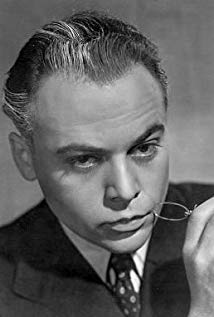
Herbert Charles Angelo Kuchačevič ze Schluderpacheru, known professionally as Herbert Lom, was a Czech-British actor with a career spanning over 60 years. His cool demeanour and precise, elegant elocution saw him cast as criminals or suave villains in his younger years, and professional men and nobles as he aged. Highly versatile, he also proved a skilled comic actor in The Pink Panther franchise, playing the beleaguered Chief Inspector Charles Dreyfus in seven films.
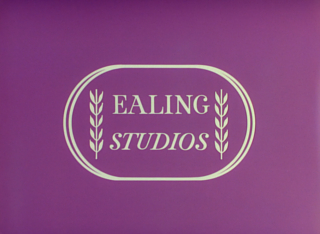
The Ealing comedies is an informal name for a series of comedy films produced by the London-based Ealing Studios during a ten-year period from 1947 to 1957. Often considered to reflect Britain's post-war spirit, the most celebrated films in the sequence include Kind Hearts and Coronets (1949), Whisky Galore! (1949), The Lavender Hill Mob (1951), The Man in the White Suit (1951) and The Ladykillers (1955). Hue and Cry (1947) is generally considered to be the earliest of the cycle, and Barnacle Bill (1957) the last, although some sources list Davy (1958) as the final Ealing comedy. Many of the Ealing comedies are ranked among the greatest British films, and they also received international acclaim.

Graham William Stark was an English comedian, actor, writer and director.
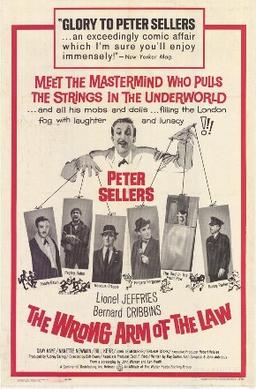
The Wrong Arm of the Law is a 1963 British comedy film directed by Cliff Owen and starring Peter Sellers, Bernard Cribbins, Lionel Jeffries, John Le Mesurier and Bill Kerr. It was written by John Antrobus, John Warren, Len Heath, Ray Galton and Alan Simpson, and made by Romulus Films.
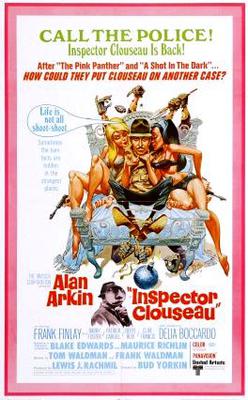
Inspector Clouseau is a 1968 British comedy film, and the third installment in The Pink Panther film series. It was directed by Bud Yorkin, written by brothers Frank Waldman and Tom Waldman and stars Alan Arkin as the title character. It was filmed by Mirisch Films at the MGM-British Studios, Borehamwood and in Europe.

Angela Margaret Leslie Thorne was an English actress of stage, television and film having performed roles in World in Ferment (1969), Get Some In! (1976), The Good Life (1977), Midsomer Murders, Foyle's War and Heartbeat, The BFG (1989) as the voice of the Queen, Three Up, Two Down and Lassie (2005).

Bessie Kate Johnson was an English actress who appeared on stage from 1894 and on screen from the 1930s to the 1950s.

The Two Faces of Dr. Jekyll is a 1960 British horror film directed by Terence Fisher and starring Paul Massie, Dawn Addams, Christopher Lee and David Kossoff. It was produced by Michael Carreras for Hammer Film Productions. The screenplay was by Wolf Mankowitz, based on the 1886 novella Strange Case of Dr Jekyll and Mr Hyde by Robert Louis Stevenson.
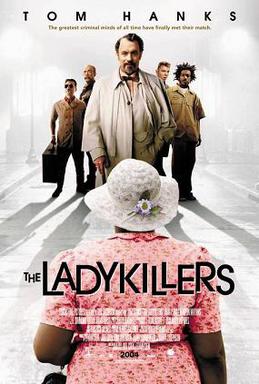
The Ladykillers is a 2004 American black comedy crime thriller film written, directed, produced and edited by Joel and Ethan Coen. The Coens' screenplay was based on the 1955 British Ealing comedy film of the same name, which was written by William Rose. The Coens produced the remake with Tom Jacobson, Barry Sonnenfeld, and Barry Josephson. It stars Tom Hanks, Irma P. Hall, Marlon Wayans, J. K. Simmons, Tzi Ma and Ryan Hurst, and marks the first time that the Coens have worked with Tom Hanks and the first remake by the Coens. This was the first film in which Joel and Ethan Coen share both producing and directing credits; previously Joel had always been credited as director and Ethan as producer.

Only Two Can Play is a 1962 British comedy film directed by Sidney Gilliat starring Peter Sellers, Mai Zetterling and Virginia Maskell. The screenplay was by Bryan Forbes, based on the 1955 novel That Uncertain Feeling by Kingsley Amis.

Cosh Boy is a 1953 British film noir based on an original play by Bruce Walker. It was directed by Lewis Gilbert and featured James Kenney and Joan Collins. It was made at Riverside Studios in Hammersmith.
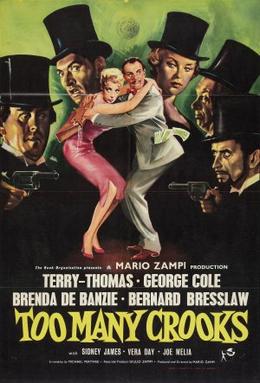
Too Many Crooks is a 1959 British black comedy film directed by Mario Zampi and starring Terry-Thomas, George Cole, Brenda De Banzie, Sidney James, Bernard Bresslaw and Vera Day.

Sir Alec Guinness was an English actor. After an early career on the stage, Guinness was featured in several of the Ealing comedies, including Kind Hearts and Coronets (1949), in which he played eight different characters, The Lavender Hill Mob (1951), for which he received his first Academy Award nomination, and The Ladykillers (1955). He collaborated six times with director David Lean: Herbert Pocket in Great Expectations (1946), Fagin in Oliver Twist (1948), Col. Nicholson in The Bridge on the River Kwai (1957), for which he won both the Academy Award for Best Actor and the BAFTA Award for Best Actor, Prince Faisal in Lawrence of Arabia (1962), General Yevgraf Zhivago in Doctor Zhivago (1965), and Professor Godbole in A Passage to India (1984). In 1970, he played Jacob Marley's ghost in Ronald Neame's Scrooge. He also portrayed Obi-Wan Kenobi in George Lucas's original Star Wars trilogy; for the original 1977 film, he was nominated for Best Supporting Actor at the 50th Academy Awards.
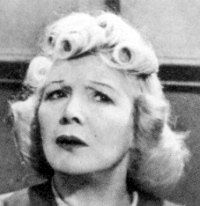
Olive Sloane was an English actress whose film career spanned over 40 years from the silent era through to her death. Sloane's career trajectory was unusual in that for most of her professional life she was essentially an anonymous bit part actress, and her best, most substantial roles did not come until relatively late in her career when she was in her 50s. Her most famous film appearance is the 1950 production Seven Days to Noon.
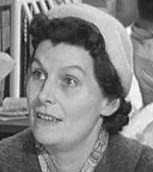
Hilda Lilian Fenemore was an English actress with a prolific career in film and television from the 1940s to the 1990s. Fenemore played mainly supporting roles which were characterised in her obituary in The Stage as "friends, neighbours, mothers and passers-by"; however, her many credits meant that she fell into the category of actresses who a majority of film and TV viewers would have been unable to name, yet whose face was instantly recognisable. Her longest-running role was recurring character Jennie Wren in TV series Dixon of Dock Green, who she played for six series between 1960 and 1965.
The Ladykillers is a 2011 stage adaptation written by Graham Linehan based on the 1955 Ealing comedy film of the same name. The play premièred at the Liverpool Playhouse in November 2011, directed by Sean Foley. It then transferred to the Gielgud Theatre in London, opening on 7 December 2011, and closed after a successful and extended run on 14 April 2012. The production, with a different cast, then embarked on a UK national tour from September to December 2012. The play returned to Ealing in March 2017, when it was performed at The Questors Theatre, located less than 500 metres from Ealing Studios, where the original 1955 film was shot. The play had its North American premiere at the Shaw Festival in Niagara-on-the-Lake, Ontario, Canada in June 2019 with Damien Atkins as Professor Marcus and Chick Reid as Mrs. Wilberforce.

Dressed to Kill is a 1928 silent film drama produced and distributed by Fox Film Corporation and starring Mary Astor and Edmund Lowe. Astor was loaned from Warner Bros., for the film.





















